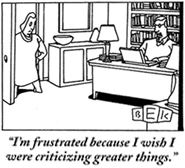# Não me lembra nada nem ninguém (6)
Excerto da secção sobre as principais tendências do jornalismo americano no relatório “The State of the News Media” de 2007 do Project for Excellence in Journalism:
The Argument Culture is giving way to something new, the Answer Culture
Critics used to bemoan what author Michael Crichton once called the “Crossfire Syndrome,” the tendency of journalists to stage mock debates about issues on TV and in print. Such debates, critics lamented, tended to polarize, oversimplify and flatten issues to the point that Americans in the middle of the spectrum felt left out. That era of argument —R.W. Apple Jr. the gifted New York Times Reporter who died in 2006, called it “pie throwing” — appears to be evolving. The program “Crossfire” has been canceled. A growing pattern has news outlets, programs and journalists offering up solutions, crusades, certainty and the impression of putting all the blur of information in clear order for people. The tone may be just as extreme as before, but now the other side is not given equal play. In a sense, the debate in many venues is settled — at least for the host. This is something that was once more confined to talk radio, but it is spreading as it draws an audience elsewhere and in more nuanced ways. The most popular show in cable has shifted from the questions of Larry King to the answers of Bill O’Reilly. On CNN his rival Anderson Cooper becomes personally involved in stories. Lou Dobbs, also on CNN, rails against job exportation. Dateline goes after child predators. Even less controversial figures have causes: ABC weatherman Sam Campion champions green consumerism. The Answer Culture in journalism, which is part of the new branding, represents an appeal more idiosyncratic and less ideological than pure partisan journalism.





<< Página principal